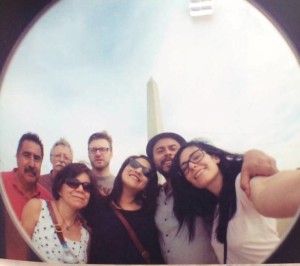”The two chief things are faith and love. Faith receives the good; love gives the good. Faith offers us God as our own; love gives us to our neighbor as his own.” – Martin Luther
Every year, as Christmas approaches, I begin to worry about budgeting both my time and money for presents while I’m home in Kansas to make sure that neither family members nor friends feel left out. It is a yearly ritual that leaves me feeling stressed. This year feels different. Working with unaccompanied children and their families, and closing a chapter on my own migration story, has given me a new perspective on Christmas and the precious time we spend together with the people we love.
A few months ago I traveled to Mexico with my parents and spent time with my extended family after 15 years of being unable to be together in the same country. As I sat in my grandmother’s dining room laughing with my cousins and aunts, it hit me how much I need those moments just sitting with my whole family. This experience also reminded me what a privilege it is to be able to have dinner with people you love, a privilege I’m well aware not everyone has and, until this year, my own family was denied.

Alaide and her family in Washingon
This year, when I visited Central America and Mexico and spoke with unaccompanied children and their families, I was reminded of the importance of family and neighborly love. I heard from many mothers who tearfully recounted why they had been forced to send their child on a dangerous journey or why they had chosen to make the journey themselves. Almost always, they spoke about the pain of separating from their families or communities.
After I returned from my own family trip to Mexico, I reflected on what those 15 years of separation had truly meant for me and my family. I found that the most painful loss was the sense of love and community we had in Mexico. Through family dinners at Christmas we were constantly reminded that we were loved and supported no matter what. Without realizing it, migrating to the United States meant losing that support. I never quite understood the importance of community, family and love until I allowed myself to feel the pain of the 15 years we had lost.
My own story and those I heard in Central America and Mexico makes me wonder if the national conversation on migration would be different if we spoke about family and love instead of border enforcement and security. Although Washington, D.C., can be a hard place to be hopeful, this Christmas season I am determined to concentrate on love, family and community and to remember all who are denied these important things.
Throughout the seemingly endless waves of violence and fear all over the world that force so many to leave their homes, I am still hopeful for positive change. I truly believe that love will conquer fear and violence, as long as we allow it to: “[Love] bears all things, believes all things, hopes all things, endures all things” (1 Corinthians 13:7).
 Alaide serves as Assistant Director for Migration Policy and Advocacy.
Alaide serves as Assistant Director for Migration Policy and Advocacy.
She lives in Washington, D.C.
